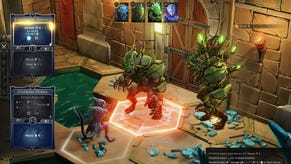Games industry is going 100% digital - Take-Two
President Karl Slatoff says physical game sales are probably going away on a 5-20 year timeline, weighs in on loot boxes
Don't expect NBA 2K38 to come on a disc. Speaking at the Credit Suisse 21st Annual Technology, Media & Telecom Conference today, Take-Two Interactive president Karl Slatoff said he ultimately sees the mix of physical/digital sales tipping entirely to one side.
"I think over the long-term, it will be 100% [digital]," Slatoff said. "I just can't predict whether that's five years, 10 years, or 20 years. It's probably less than 20 and maybe more than five, but I think it ultimately gets there. That's the zeitgeist. Things are moving in that direction.
"Why I think it's a little quicker than people imagined is honestly, Sony and Microsoft have done a really nice job with their services. You've got more people on Xbox Live, more people on PSN, and it helps. The friction is going away at a quicker rate because these platforms have been really well developed, and the consumers love it."
Even if the brick and mortar retailers of the world won't be playing a large role in Take-Two's future, Slatoff acknowledged the company still relies heavily on them in the present.
"The truth is physical retail is still the majority of our business, and very important partners of ours," he said. "And we want to do everything we can to support that environment. And we do. They're very strong marketing and distribution partners for us. But again, it's out of our control. Whether we want it or not, it looks like it's going to happen eventually."
The shift to digital has also enabled publishers to pursue business models including loot box-driven microtransactions. But as EA recently discovered with Star Wars Battlefront II, players aren't always enthusiastic about how they're incorporated. Slatoff acknowledged recent consumer uproar over the practice, but suggested their objections were not with microtransactions themselves, but the game around them.
"The whole gambling regulator thing, we don't view that sort of thing as gambling. Our view of it is the same as the ESA statement for the most part," Slatoff said. "That's going to play its course, but in terms of the consumer and the noise you hear in the market right now, it's all about content. It's about overdelivering on content and making sure you're focused on engagement. That has been our strategy and where we're focused, and as long as you keep your eye on that ball, you're going to be OK. The consumer's going to be really happy with what they get."
He added, "You can't force the consumer to do anything. You try to do your best to create the best experience you possibly can to drive engagement. And driving engagement creates value in entertainment. That's just how it's always been and always will be."








